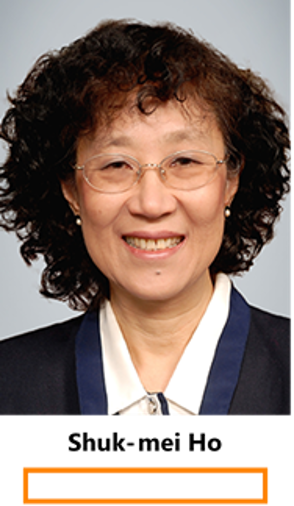
Shuk-mei Ho, PhD, has been awarded the 2020 SOT Distinguished Toxicology Scholar Award for her pivotal work elucidating the role of endocrine disruptors in disease and on the developmental origins of adult disease.
 Dr. Ho received her PhD in zoology from the University of Hong Kong in 1978. Her illustrious career in academia began as a Research Associate and later Visiting Assistant Professor at Boston University, after which she spent nearly two decades at Tufts University, where she eventually became Associate Dean for Research of the School of Graduate Studies and Continued Education. During her next appointment, at the University of Massachusetts Medical School and Memorial Health Care System, she published 50 papers in seven years, completing her tenure as Vice-Chair for Research within the Department of Surgery. Dr. Ho then held positions at the University of Cincinnati, including Director of the Cincinnati Cancer Center, Director of the Center for Environmental Genetics, and Associate Dean for Basic Research in the University of Cincinnati Medical Center.
Dr. Ho received her PhD in zoology from the University of Hong Kong in 1978. Her illustrious career in academia began as a Research Associate and later Visiting Assistant Professor at Boston University, after which she spent nearly two decades at Tufts University, where she eventually became Associate Dean for Research of the School of Graduate Studies and Continued Education. During her next appointment, at the University of Massachusetts Medical School and Memorial Health Care System, she published 50 papers in seven years, completing her tenure as Vice-Chair for Research within the Department of Surgery. Dr. Ho then held positions at the University of Cincinnati, including Director of the Cincinnati Cancer Center, Director of the Center for Environmental Genetics, and Associate Dean for Basic Research in the University of Cincinnati Medical Center.
In her current position as Vice Chancellor for Research at the University of Arkansas for Medical Sciences, Dr. Ho oversees strategic planning and administration of research portfolios in six colleges and seven institutes at the main campus in Little Rock, Arkansas; the Northwestern Arkansas campus; and across eight regional medical campuses in Arkansas.
Dr. Ho is a leader in developmental and reproductive toxicology. Her research relating early exposure to bisphenol A to increased cancer risk later in life bolstered the ban against the use of bisphenol A in products for babies and children. Further, Dr. Ho first demonstrated that epigenetics plays a major role in gene-environment interactions and disease etiology, and she contributed significantly to the idea that there were windows of susceptibility in toxicant-induced diseases. Dr. Ho’s findings opened the possibility of using biomarkers of early-life exposure to predict and prevent environmental diseases later in life.
 Dr. Ho’s massive publication record is a testament to her distinction in the field. Her more than 240 articles have been cited 17,500 times, resulting in an h-index of 69 and contributing to the furtherance of environmental epigenetics and the understanding of developmental origins of adult health and disease.
Dr. Ho’s massive publication record is a testament to her distinction in the field. Her more than 240 articles have been cited 17,500 times, resulting in an h-index of 69 and contributing to the furtherance of environmental epigenetics and the understanding of developmental origins of adult health and disease.
Further, through her commitment to instruction and training, Dr. Ho has garnered over $50 million in funding from the National Institutes of Health (NIH), and her work has been continuously supported by the NIH for more than 30 years. She has trained more than 80 pre- and postdoctoral fellows, clinical researchers, junior faculty, and international visiting scholars in her laboratory. Dr. Ho has been an SOT member since 2008.

EDITOR’S SIDEBAR: Distinguished Toxicology Scholar Award Lecture at the SOT 59th Annual Meeting and ToxExpo
Dr. Shuk-mei Ho will deliver the Distinguished Toxicology Scholar Award Lecture on Tuesday, March 17, 2020, from 11:00 am to 12:00 noon in Ballroom E of the Anaheim Convention Center. The topic of Dr. Ho’s lecture is “Endocrine Disruption, Epigenetics, and Developmental Basis of Disease—Looking Back as We Look Forward.” The lecture abstract is as follows:
Our early research established that bisphenol A, an endocrine disruptor, impacts prostate cancer risk through epigenetic reprogramming of the perinatal prostate transcriptome. We then extended our investigations to uncover DNA methylation changes in bodily fluids as biomarkers of exposure, disease prediction, and patient stratification. We further evaluated the influences of lifestyle factors such as high-fat diet as modulators of sensitivity to toxicants. Overall, our research has bettered our understanding of the interplay between genetics and epigenetics in disease development as well as how early-life experiences can be a root cause in later development of cancers, asthma, neural disorders, and other complex chronic diseases. Current and future focused research areas are in transgenerational effects, toxicants’ effects on stem cell lineage and function, single cell responsiveness, and toxic effects of environmental mixtures, as well as community action research. In conclusion, this body of highly innovative and paradigm-changing research has advanced basic/translational environmental health science and will continue to catalyze major changes in public health and medical practices in the nation and around the globe.
